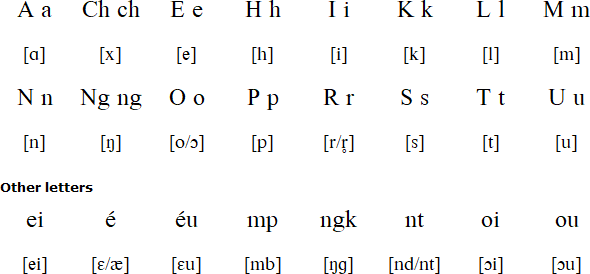Lote is a Western Oceanic language spoken by about 5,500 (in 2004) in East New Britain Province in Papua New Guinea, specifically around Cape Dampier on the south coast of New Britain. The language was formerly known as Uvol, the name of a local river.
Lote was first documented by Catholic priests, and more recently by Greg Pearson.

Sources: http://www-01.sil.org/pacific/png/abstract.asp?id=51611 and http://www-01.sil.org/acpub/repository/Lote_Alphabet_Book.pdf
Download a alphabet chart for Lote (Excel)
Helenga mukangana nga paita. Non e neu songong kaone pe kaone tesaolia paita. Paita tana elle mes nge Meium. Kileng neu tehetue ene Meium. Iok la kaone tepurtaua teteke tealangesia paita neu ke tehetue ene aita. Iok tokoninga at sapele, longorusia tepurelelia. Iok takue kakop nga paita pe la palchachia ke ulo pe kaone tengau sapele. Iok ana non ngana meneheke ke ngau totourume pe lemene urana. Iok heto sapele ke teke ure nei ene aita. Iok pe la menehaka matanahotngana e tue. Tue ke ulo ke la aka pe tengau sapele ana koukou pe metuchngana sapele. Iok ana paita tetunglele sapele ke kileng lochloch tetue. Hetlo.
This is the story of the first coconut. A man went hunting with dogs and his dogs happened upon some coconuts. A coconut tree grew at Meium. They called that place Meium. So then the dogs worked at trying to eat the coconut. Therefore they called it "aita" . Well the dog owner came and heard them trying to husk the coconut. So then he hit the coconut with his knife until it broke and the dogs came and ate it. So the man picked it up to taste it and it was good. So he named this thig here 'aita'. So then he picked up a sprouting one and planted it. When they had finished planting it and it had grown, they ate both the young green coconut and the dry coconut. Well then they gave the coconut out to every place so they could plant it. That's the end of the story.
Source: http://www-01.sil.org/pacific/png/abstract.asp?id=51611
Information about Lote
https://en.wikipedia.org/wiki/Lote_language
http://www.ethnologue.com/18/language/uvl/
https://www.sil.org/language/xsi
http://www-01.sil.org/pacific/png/show_pubs.asp?pubs=biblio&code=uvl
Adzera, Ahamb, Äiwoo, Aneityum, Apma, Araki, Are, ’Auhelawa, Avava, Babatana, Bariai, Bola, Big Numbas, Buhutu, Bwaidoka, Caac, Cheke Holo, Dorig, Hiri Motu, Hiw, Hoava, Kakabai, Kaninuwa, Kokota, Kove, Kurti, Lakon, Lehali, Lenakel, Lewo, Lote, Lo-Toga, Löyöp, Manam, Marovo, Maskelynes, Mato, Mavea, Mono-Alu, Motu, Mussau-Emira, Mwotlap, Nafsan, Nahavaq, Namakura, Nanggu, Nduke, Neve‘ei, Neverver, Ninde, North Efate, Nume, Paamese, Papapana, Raga, Rotuman, Roviana, Sa, Sakao, Saliba, Siar, Sio, Ske, Sobei, Sursurunga, Tamambo, Tami, Teanu, Tigak, Tirax, Tolai, Touo, Ubir, Ughele, Uneapa, Vatlongos, Vitu, Vurës, Western Fijian, Yabem, Yapese
Languages written with the Latin alphabet
Page last modified: 31.10.22
[top]
You can support this site by Buying Me A Coffee, and if you like what you see on this page, you can use the buttons below to share it with people you know.

If you like this site and find it useful, you can support it by making a donation via PayPal or Patreon, or by contributing in other ways. Omniglot is how I make my living.
Note: all links on this site to Amazon.com, Amazon.co.uk
and Amazon.fr
are affiliate links. This means I earn a commission if you click on any of them and buy something. So by clicking on these links you can help to support this site.
[top]